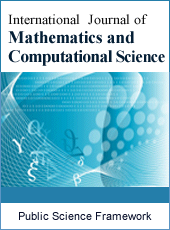International Journal of Mathematics and Computational Science
Articles Information
International Journal of Mathematics and Computational Science, Vol.2, No.1, Feb. 2016, Pub. Date: Jan. 6, 2016
An Efficient Image Denoising Approach Based on Dictionary Learning
Pages: 1-7 Views: 3320 Downloads: 1179
[01]
Mohammadreza oor Karimip, Department of Electronics, Faculty of Engineering, Shahrood Science and Research Branch, Islamic Azad University, Shahrood, Iran.
[02]
Vahid Abolghasemi, Faculty of Electrical Engineering and Robotics, University of Shahrood, Shahrood, Iran.
[03]
Saideh Ferdowsi, Faculty of Electrical Engineering and Robotics, University of Shahrood, Shahrood, Iran.
In this paper, a denoising method based on dictionary learning has been proposed. With the increasing use of digital images, the methods that can remove noise based on image content and not restrictedly based on statistical properties has been widely extended. The major weakness of dictionary learning methods is that all of these methods require a long training process and a very large storage memory for storing features extracted from the training images. In the proposed method, using the concept of sparse matrix and similarities between samples extracted of similar images and adaptive filters the training process of dictionary based on ideal images have been simplified. Finally Images are checked based on its content by implicit optimization of memory usage and image noise will be removed with a minimum loss of stored samples in existing dictionary. At the end, the proposed method is implemented and results are shown its capabilities in comparison with other methods.
Denoising, Sparsity, Clustering, Kmeans, Dictionary Learning
[01]
Manjon. J, Coupe. C, Buades. A, Collins. L, Robles. M, New methods for MRI denoising based on sparseness and self-similarity, 2012, ELSEVIER, Medical Image Analysis 16 (2012) 18–27.
[02]
Guleryuz, O. G, Weighted over complete denoising. 2003, In: Proceedings of the Asilomar Conference on Signals and Systems.
[03]
Bao. L, Robini. M, Liu. W, Yuemin. Z Structure-adaptive sparse denoising for diffusion-tensor MRI, 2013, ELSEVIER, Medical Image Analysis 17 (2013) 442–457.
[04]
Golshan. H, Hasanzadeh. R, Yousefzadeh. Sh, An MRI denoising method using image data redundancy and local SNR estimation, 2013, Elsevier, Magnetic Resonance Imaging 31 (2013) 1206–1217.
[05]
Lahmiri. S, Boukadoum. M, Biomedical Image Denoising Using Variational Mode Decomposition, 2014, IEEE, 978-1-4799-2346-5.
[06]
Mohan. J, Krishnaveni. V, A Neutrosophic Approach of MRI Denoising, 2011, IEEE, 978-1-61284-861-7.
[07]
Hong. J, Luisier. F, and Wolfe. P. J, Magnitude MR Image Denoising Via Cure-Optimized Non-Local Means, 2012, IEEE, 978-1-4577-1858-8.
[08]
Mustafa, Z.A.; Abrahim, B.A.; Kadah, Y.M., "K11. Modified Hybrid Median filter for image denoising," in Radio Science Conference (NRSC), 2012 29th National, vol., no., pp.705-712, 10-12 April 2012.
[09]
Satheesh. S, Prasad. K, Medical Image Denoising Using Adaptive Threshold Based ON Contourlet Transform, March 2011, Advanced Computing: An International Journal (ACIJ), Vol. 2, No. 2.
[10]
Elad, M. and Aharon, M. (2006). Image denoising via sparse and redundant representations over learned dictionaries. IEEE Trans. IP, 54(12): 3736–3745.
[11]
Huibin Li; Feng Liu, "Image Denoising Via Sparse and Redundant Representations Over Learned Dictionaries in Wavelet Domain," in Image and Graphics, 2009. ICIG '09. Fifth International Conference on, vol., no., pp.754-758, 20-23 Sept. 2009.
[12]
Hui Luo, Hongliang Chu, Yao Xu, Clustering-Based Image Sparse Denoising in Wireless Multimedia Sensor Networks. Journal of Circuits, Systems, and Signal Processing, March 2015, Volume 34, Issue 3, pp 1027-1040.
[13]
Weisheng Dong; Xin Li; Zhang, D.; Guangming Shi, "Sparsity-based image denoising via dictionary learning and structural clustering," in Computer Vision and Pattern Recognition (CVPR), 2011 IEEE Conference on , vol., no., pp.457-464, 20-25 June 2011.

ISSN Print: 2381-7011
ISSN Online: 2381-702X
Current Issue:
Vol. 5, Issue 2, June Submit a Manuscript Join Editorial Board Join Reviewer Team
ISSN Online: 2381-702X
Current Issue:
Vol. 5, Issue 2, June Submit a Manuscript Join Editorial Board Join Reviewer Team
| About This Journal |
| All Issues |
| Open Access |
| Indexing |
| Payment Information |
| Author Guidelines |
| Review Process |
| Publication Ethics |
| Editorial Board |
| Peer Reviewers |


